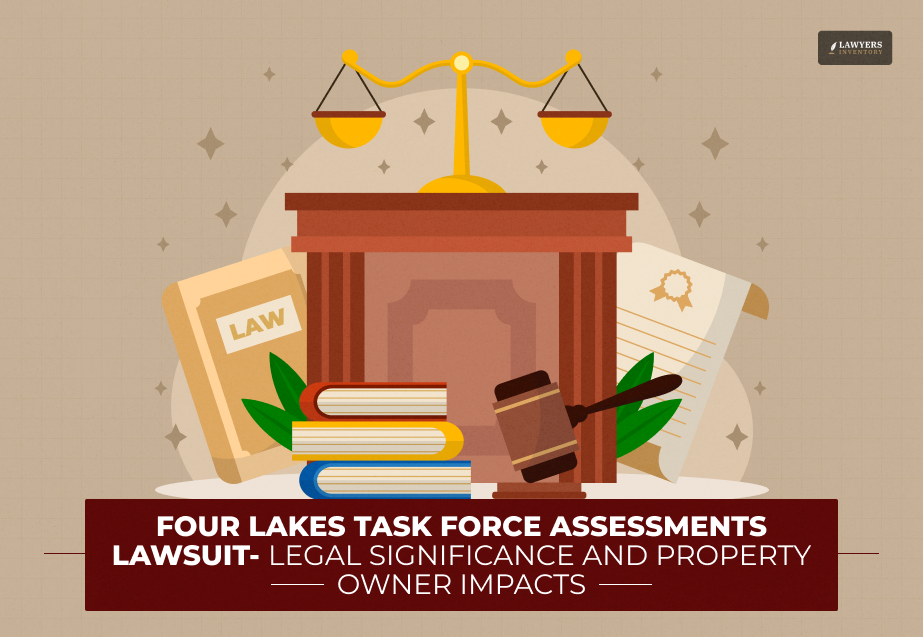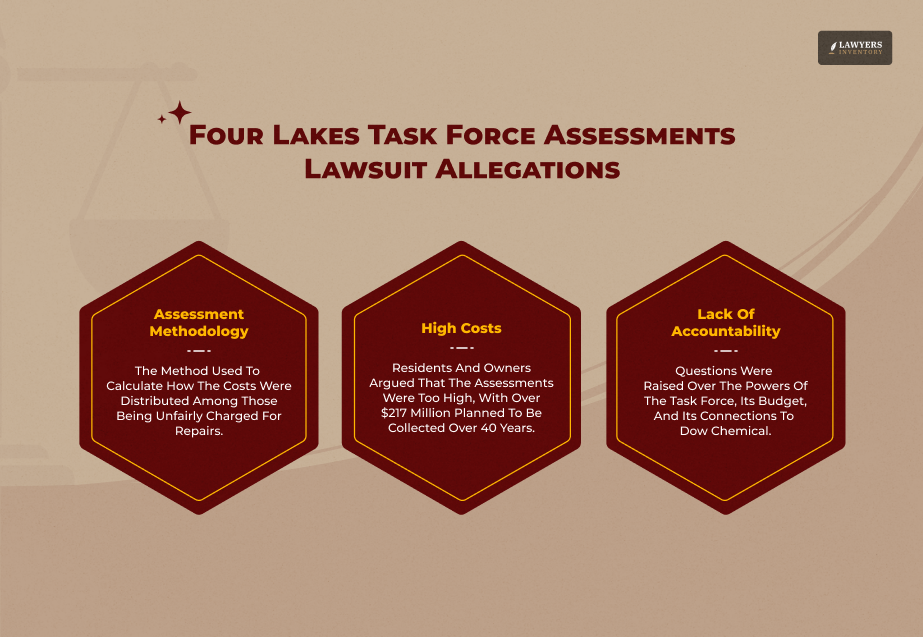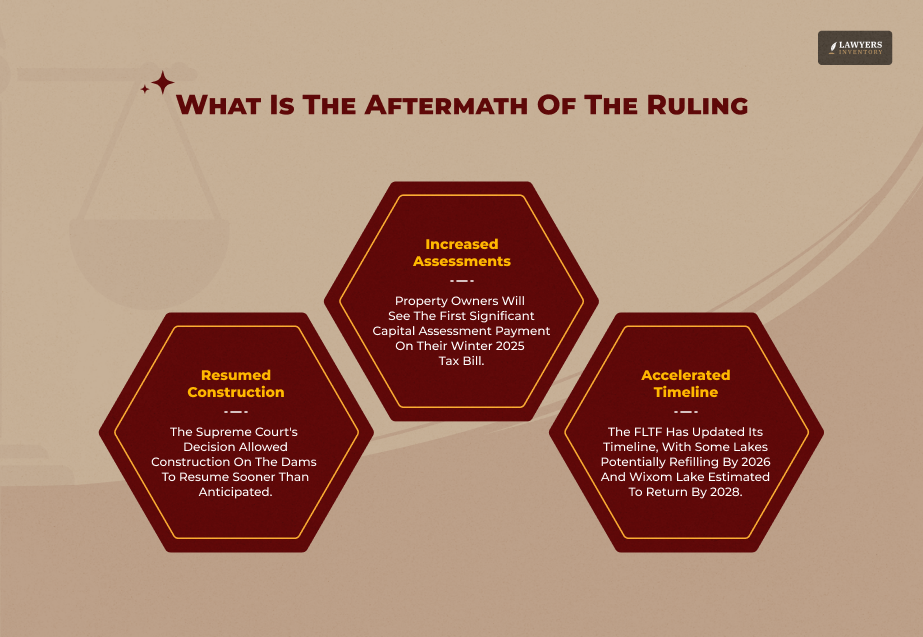
Today’s topic: Four Lakes Task Force Assessments Lawsuit.
The dramatic failure of the Sanford and Edenville dams in May 2020 ravaged the Four Lakes Michigan towns. Tragedy hit Wixom and Sanford lakes, leveled over 2,500 structures, and caused large-scale evacuations.
Homeowners were hit with a huge financial and legal struggle. This struggle is because of a special property tax they have to pay. So, let’s learn more about the Four Lakes Task Force Assessments Lawsuit.
It is referred to as a “special assessment.” The money it collects is being used to replace the damaged dams.
And who made it happen? The Four Lakes Task Force (FLTF) and county administrators made it a condition of this special assessment.
The big question for all is, why should this matter to people who do not live near the four lakes?
This lawsuit is important because it has implications for all property owners in the Special Assessment District (SAD) and sets a precedent for the way local governments across the country can finance huge rebuilding projects.
This article will give you all the facts on:
- The court proceedings and most significant decisions (judgments by the court).
- The massive financial burden (wide-ranging financial impact) is placed on property owners due to this special assessment.
Four Lakes Task Force Assessments Lawsuit: Timeline
Here’s a complete timeline of the Four Lakes Task Force Assessments Lawsuit:
- 6th February, 2024: Midland and Gladwin counties approve the maintenance, capital, and maintenance assessment rolls of 2025-2026.
- March 2024: Construction was suspended because of litigation over the entire assessment plan.
- March 2024: The HCA (Heron Cove Association) filed two different lawsuits – one in Gladwin and one in Midland County Circuit Courts to allege constitutional violations along with rejection of the whole process.
- 6th January, 2025: The Michigan Court of Appeals upheld the $218 million assessment and ruled against the claims of the HCA.
- 11th April, 2025: The Michigan Supreme Court denied the appeal of the HCA. Also, the court allowed the special assessment to move forward.
Four Lakes Task Force Assessments Lawsuit: Unconstitutional Taking And Due Process

After the dam breakages, Midland and Gladwin Counties’ governing body, the Four Lakes Task Force (FLTF), started a project to rebuild the dams. This called for the establishment of a Special Assessment District (SAD) under the Michigan Inland Lake Level Act (ILLA) (Michigan Courts).
“Four Lakes has been the lead agency in the recovery and restoration of the impacted lakes, which serve more than 8,000 properties.
While Four Lakes has secured more than $200 million in state and federal grants to repair the region, the total cost to rebuild is nearly $400 million. “
“Michigan Court of Appeals Affirms Ruling for Counties Represented by Clark Hill in Midland Flood Dispute”- Joseph W. Colaianne, Lauren K. Burton, Zachary C. Larsen.”
Construction cost was approximately $400 million, out of which over $200 million came from state and federal grants. The remaining over $200 million would be funded by property owner charges levied against approximately 8,000 properties (Michigan Public).
A group of homeowners, the Heron Cove Association (HCA), brought a suit to prohibit the levy. They contended on several constitutional grounds that the Four Lakes Task Force’s lawsuit was illegal.
Precisely, they contended they were deprived of due process of law. They further asserted that the assessment was an unconstitutional taking without compensation of property.
Legal Outcome: State Courts Uphold The Assessments
The court battle regarding the four lakes task force reviews lawsuit went swiftly through the Michigan court system. The Midland County Circuit Court and the Court of Appeals for Michigan affirmed the county’s decision.
Additionally, the courts all concluded that the counties and the FLTF had met all procedural due process requirements established by the ILLA.
The Michigan Supreme Court delivered the coup de grâce in April 2025. It denied leave to appeal application by the HCA, thus shutting down the state-level challenge to the special assessment.
The court decision resolved the four lakes task force assessments lawsuit and cleared the way for the counties to go ahead and issue municipal bonds to fund the construction.
Implications: Special Assessment District
This ruling supports the broad authority given to counties and their agencies by Michigan law to create a Special Assessment District to fund public improvements. The court also supports the assessment methodology used by the FLTF.
Finally, the court ruled that the plaintiffs were not able to demonstrate sufficient evidence of no assessment benefit to property owners or denial of due process.
Assessment Methodology Under Review: The Allegation-Benefit vs. Cost Structure
Among the main doctrines of the four lakes task force assessments lawsuit was how the calculations were made in arriving at each assessment. The property owners’ association had accused the FLTF of reversing the calculated assessment.
And, the association accused the task force of calculating the assessments to arrive at a precalculated amount. This was happening instead of the present financial benefit each property owner would accrue from lake restoration.
Lawyer Michael Homier of HCA opined that the vast majority of clients simply could not pay the exorbitant rate of the owner fees, and they could be more than $48,000 after 40 years.
FLTF’s Defense: Far-Reaching And Linked Benefits
The Four Lakes Task Force defended their approach on the premise that the dams are hydraulically linked. Thus, analysis must encompass all four lakes and dams collectively.
They maintained that restoration of water levels and resultant recovery of the valuation of lake properties offer a substantial and measurable special benefit. The FLTF also acknowledged the extended public involvement process.
Thus, this led to many changes in the roles of assessment prior to final adoption.
Legal Decision: Proof Of Special Benefit
The appeal courts agreed with the Four Lakes Task Force. The courts deliberated that the improvement of the lakes, a lost benefit in the Midland County dam failure, would inevitably restore the lake property appraisal value.
More significantly, the court believed the appellants were not at liberty to quote against the market valuation of assessed property before and after improvement.
Besides, this validated the legality of the four lakes task force assessments case and the process undertaken for the assessment rolls.
Federal And Constitutional Challenges: The Claim
In spite of the losses at the state level, the legal fight continued with the federal lawsuits. Two separate lawsuits were brought by HCA in the Federal District Court alleging a constitutional violation.
The subject matter of this segment of the four lakes task force assessments lawsuit was allegations of unconstitutional “taking” of property and denial of due process under the U.S. Constitution.
Legal Proceedings: Federal Dismissal
The federal court case added another layer to the complex four-lakes task force evaluations case timeline. In March 2025, U.S. District Judge Matthew Leitman signed an order dismissing all of HCA’s complaints in the two federal court cases against the counties and the Four Lakes Task Force.
Lastly, the dismissal was another big win for the FLTF. Moreover, it allowed the restoration project to proceed without further legal barriers.
Local Government Accountability
The four lakes task force assessments lawsuit is one example of widespread concerns about Local government accountability for dam safety and infrastructure financing. The fatal Midland County dam failure was labeled “foreseeable and preventable” by an Independent Forensic Team.
In addition to being separate from the assessment suit, there is a continuing class-action suit against the former owner and the state of Michigan. It is based on years of state regulatory breakdown and the initial negligence of the former private owner.
Thus, this demonstrates the determination of the community for accountability beyond the Four Lakes Task Force’s property owner assessments.
Expert Analysis And Recommendations: Legal Perspectives
Legal experts regard the dismissal of the four lakes task force assessments case as a slam-dunk win for Michigan’s Inland Lake Level Act. The courts distinctly ruled that what the counties did, through the Four Lakes Task Force, was entirely in compliance with all relevant statutory laws.
However, the case did involve long delays, adding to the overall cost to the community. Firms and government agencies that both undertake the same public works have to emulate this case as an unquestionable adherence to procedural law.
They have to maintain the “special benefit” to owners as evidence of the legality of subsequent Special Assessment District formations.
Read Also: Why $100 Million Settlement Fund from Verizon Wireless Class Action Lawsuit is All Over the News!
Property Owner Advice: Stay Informed

And for SAD property owners, the news is out: the four lakes task force assessments lawsuit has concluded in the FLTF’s favor. The special assessment will persist.
Homeowners will have to investigate information regarding the newly created Four Lakes Housing Assistance Fund. This provides support to the Capital Special Assessment for low-income families. They should know the information related to the financial safety net.
Furthermore, all homeowners must also remain actively posted on the work of the Four Lakes Task Force regarding the following things:
- Construction process of the dam.
- Planning for the reconstruction funding of the dam.
Read Also: Direct Fairways Lawsuit- Allegations, Legal Implications, And Consumer Impact
Frequently Asked Questions (FAQs):
Check out the most frequently asked questions related to the Four Lakes Task Force lawsuit:
The original state statute is the Inland Lake Level Act, or ILLA. People also know it as Part 307 of the Natural Resources Environmental Protection Act, or NREPA, MCL 324.30701 et seq. The legislation enables counties to regulate lake levels and finance projects like dam reconstruction via a Special Assessment District.
No. The property owners’ special assessment will cover about 55% of the total cost, which is currently at nearly $400 million. The state and federal grants cover the cost of the balance, which has been considerable, as the State of Michigan demonstrated by granting $200 million in 2022.
With the four lakes task force assessments lawsuit legal barrier eliminated, the municipalities will be able to again issue municipal bonds. The future revenue from the property owner charges collected within the Special Assessment District backs these loans.
People also filed private actions against the dams’ former owner, Boyce Hydro. The major claims and allegations involved negligence that caused the Midland County dam’s collapse. These cases are separated from the suit concerning the Four Lakes Task Force evaluations in terms of constitutionality.
Four Lakes Task Force, working in cooperation with neighborhood community foundations, assisted in founding the Four Lakes Housing Assistance Fund, offering assistance and financial aid for the Capital Special Assessment to low-income homeowners.
The Second Lake Dam failed on 19th May, 2020. Apart from Secord, Sanford, Smallwood, and Edenville dams also failed due to heavy rainfall and subsequent flooding. The failure of these dams led to the evacuation of 11,000 people and heavy damage to 2,500 structures.












0 Reply
No comments yet.